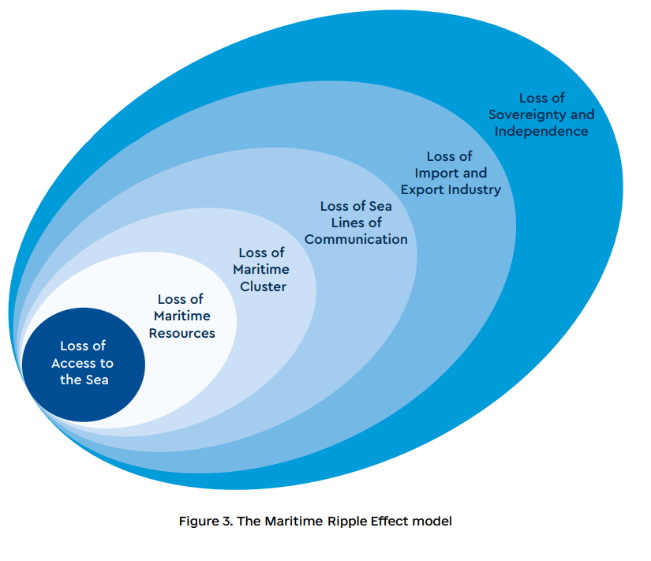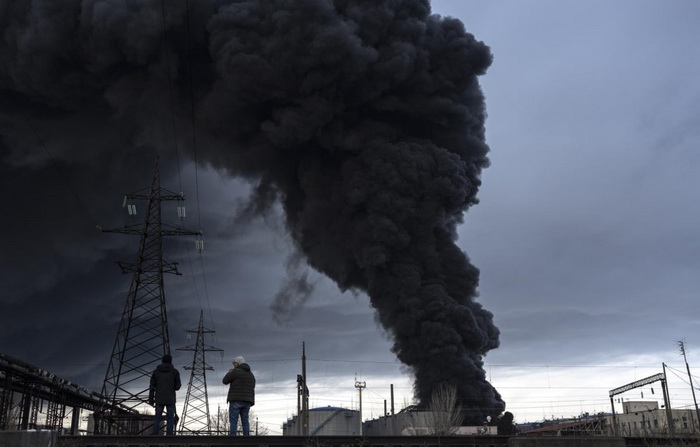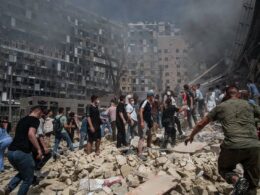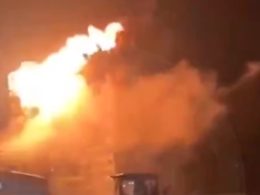The international condemnation of the Russian war crimes in Bucha is understandably strong and might – 40 days into the full-scale war and more than 8 years after the war started – finally mobilise Europe to do what is needed to stop Russia. Even Germany is reassessing its stand on energy sanctions. The next EU sanctions might be the strongest yet. Maybe.
That said, Bucha is just a showcase of what is happening all over Ukraine. Russia has been conducting indiscriminate bombing and shelling of many cities since 24 February. Mariupol and Chernihiv have been destroyed in a manner we have not seen since the Russian assault on Grozny in 1999. Russian forces are presently occupying Ukrainian cities and villages across the eastern and southern parts of Ukraine.
Due to ongoing fighting and not at least, due to Russian occupation, we might very well never get to know the full extent of its atrocities and war crimes. While it can not stop witnesses from giving their accounts of the horror, Russia will make sure that international press or organisations will not be able to convey images as we just saw from Bucha. This leaves Russia free to continue its barbarisms.
#Russia invaders mine children’s playgrounds and leave trail of horrific #WarCrimes in #Motyzhyn, #Bucha, other parts of #Kyiv oblast #RussiaWarCrimes #PutinWarCrimes #StandWithUkraine #Ukraine #Irpinhttps://t.co/eqMwCIASja pic.twitter.com/4UK2VPSL7N
— Halya Coynash (@halyapuff) April 3, 2022
An UN-mandated Humanitarian Intervention enforced by NATO, supported by a coalition of other willing states, is now a demand. Russia is daily crossing the red lines the West hasn’t yet declared.
Future threats
I have previously argued for a very different scenario altogether. After 40 days of intense warfighting and Russian failure to reach its main objective, we might find that the campaign is about to turn into what I described as a “Humanitarian Intervention scenario” (which at this stage, is a horrible and distorted description of what are Russian atrocities). I argued that:
“… a "humanitarian intervention" in Donbas [is] likely. Russia has already conducted several operations based on "Responsibility to Protect" (R2P). In 2008, Russia argued that it was “necessary to end what it termed a genocide against South Ossetians and to protect Russian civilians (many South Ossetians had received Russian passports).” In 2014, Putin claimed that the annexation of Crimea was a response to “real threats” to Russian-speaking minorities in the region.
The humanitarian crisis in the temporarily occupied territories of the Donetsk and Luhansk regions (and therefore, the Russian intervention) has been in the making for more than seven years already. Russian “passportification” started there in 2019 already, turning Ukrainians into “Russian citizens.” Russia has not only caused a dire and deteriorating humanitarian situation but also conducted an intensive disinformation operation depicting Ukraine as being responsible for the atrocities.
It has simultaneously created the national legal framework, developed the key strategic documents and built the military capacity needed to conduct a “humanitarian” intervention. Russia has even argued for an international peacekeeping mission to Donbas, on terms unacceptable for both Ukraine and the West […].
A “humanitarian intervention,” though limited in scope might prove to be a “game-changing” crisis. The presence of a "peacekeeping force" supported by a no-fly zone and maritime embargo might prove devastating for Ukraine.”
In the report “Ukrainian storm warning” by the Centre for Defence Strategies, I outlined the “Maritime Ripple Effects” resulting from an embargo/blockade.
“Any interruption of maritime trade and freedom of navigation will cause ripple effects across all sectors of the Ukrainian economy and society, as its future prosperity is closely linked to the maritime domain. The Maritime Ripple Effect model illustrates how a maritime conflict might impact all of Ukraine and ultimately, Ukrainian independence and sovereignty.
The freedom of navigation and consequently, of Sea Lines of Communication (SLOC) is already being challenged. Russian actions in the Kerch Strait and the Sea of Azov show how this affects all parts of society, from industry and agriculture to social development and the stability of society. Russia has demonstrated both the will and the ability to restrict and ultimately, stop all maritime trade through the closure of the Kerch Strait and the regular closure of major parts of the Black Sea on the pretext of ‘exercises’.
If (or when) Russia decides to impose a full blockade of all Ukrainian ports, the Ukrainian economy will collapse. The loss of access to the sea will stop all maritime imports and exports. This will result in the loss of jobs and income, affecting all other parts of the Ukrainian business environment. The loss of freedom of navigation and SLOCs will severely damage a number of industries and severely affect the lives of millions of Ukrainians. This would further destabilize Ukraine from within, undermining the sovereignty and independence of the country.

Ukraine is presently unable to challenge the Russian Black Sea Fleet or its multi-layered Anti Access/Area Denial (A2/AD) capacity in the Black Sea. That is a critical vulnerability with a potential devastating ‘Maritime Ripple Effect’.”
The reason for focusing on the “Humanitarian Intervention” scenario and the “Maritime Ripple Effects” is to highlight that a peace agreement will not save Ukraine. Russia is not only waging an unjust and unprovoked war on the ground but has already established the basis to continue an operation under the excuse of “Responsible to Protect.”
Russia has expanded the area it controls in the east, increasing the pressure on Ukraine. Its regular forces have been deployed into the theatre to “support” the Russian proxy forces that have been in place since 2014. Having reduced the Ukrainian Air Force and Air Defence, the Russian Air Force is nearly in the position of establishing a “No-Fly zone” over Donbas. The Navy is already enforcing a blockade of all Ukrainian ports, denying both import and export.
Additionally, Russia has achieved a land corridor between Russia and the Crimean peninsular, full control over the Sea of Azov and access to water supplies for Crimea.
A peace agreement in the present situation might destroy Ukraine. The present situation does not create the economic basis for an independent and sovereign state.
To re-establish this, Ukraine needs to rebuild both its Navy and Air Force. This urgently requires both a Marshall plan for Ukraine as well as a NATO presence on and above the Black Sea.
Read more:
- Timothy Snyder: If Ukrainians hadn’t fought back, the world would’ve been a much darker place
- How realistic is the Ukrainian “peace plan”?
- No NATO aspirations and freezing occupied Crimea for 15 years: Ukrainian position at talks with Russia
- Why the world must stop Putin in Ukraine
- What weapons for Ukraine would help it win the war against Russia





